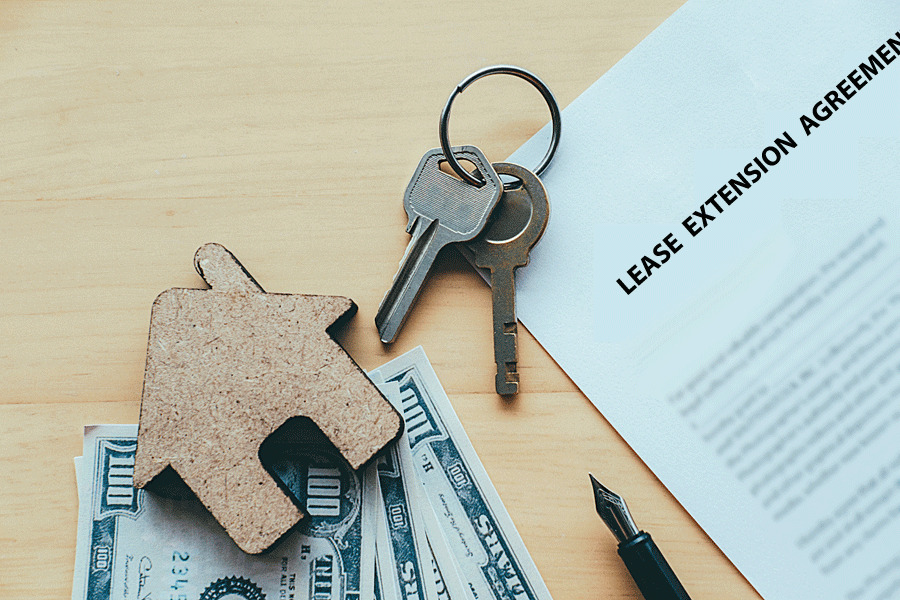A salon booth rental agreement is a contract that is entered into between a salon owner and hair stylists who are independent contractors.
It is very similar to the agreement between an apartment landlord and tenant, but instead of paying rent for a place to live, you are paying rent for a place to work. To give their clients hair services, stylists rent the booth (a salon chair and a space to work) from the owner of an established salon.
A rental agreement for a booth in a hair salon is an agreement between the owner of the salon (the lessor) and a hair stylist (the lessee) interested in taking up occupancy or rendering their service through the lessor’s business for a specified duration.
This rental agreement can be month-to-month, week-to-week, or for a fixed duration. Under this agreement, the tenant shall remit the rental payment and, in some instances, a certain percentage of his income periodically. The premise is wholly used for income from hair styling and haircut services.
Salon Booth Rental Agreement Templates
Here are some free downloadable agreement templates that can be customised as per need:
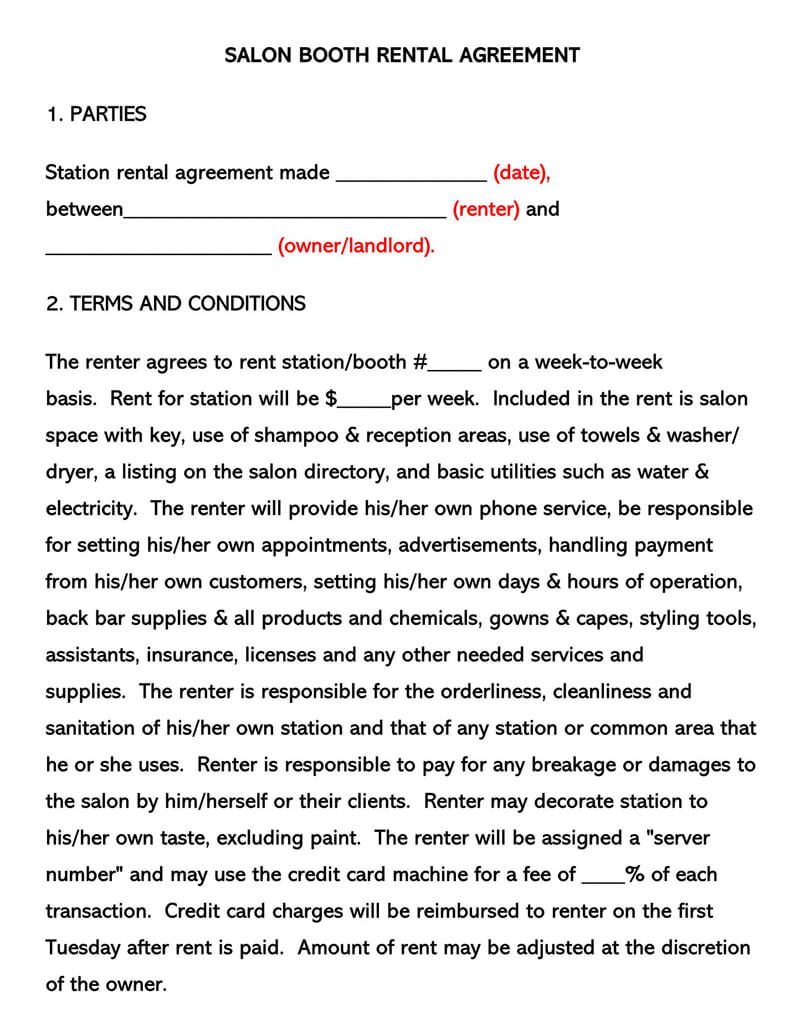
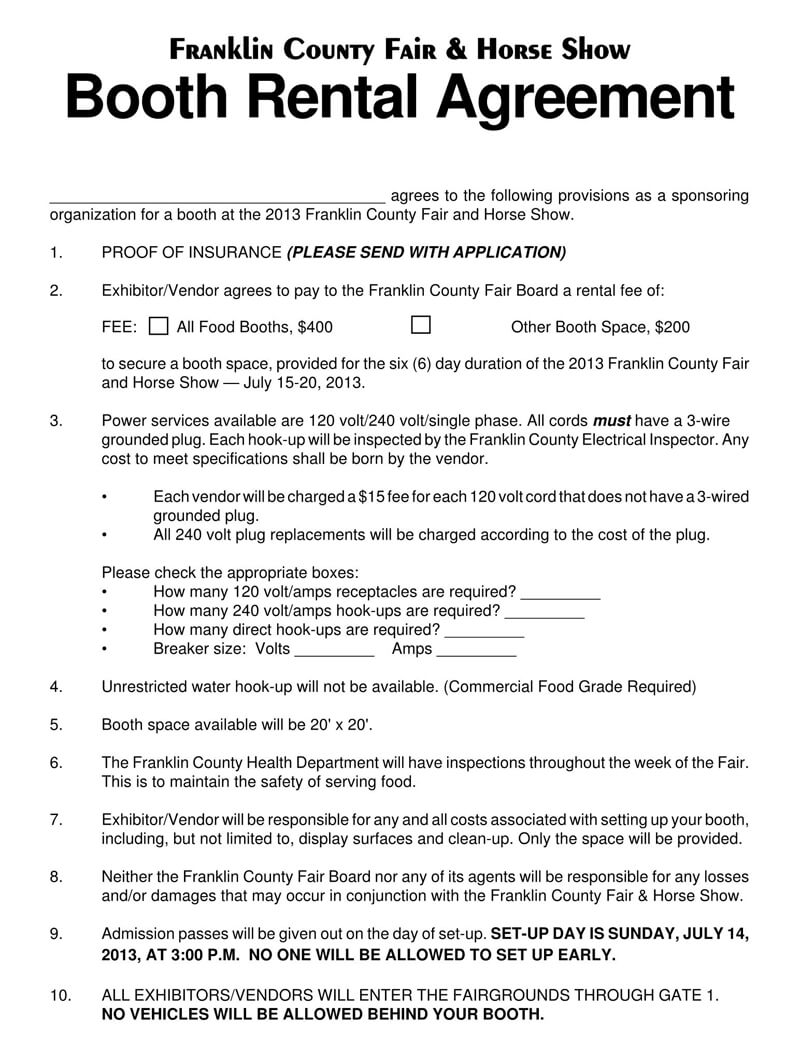
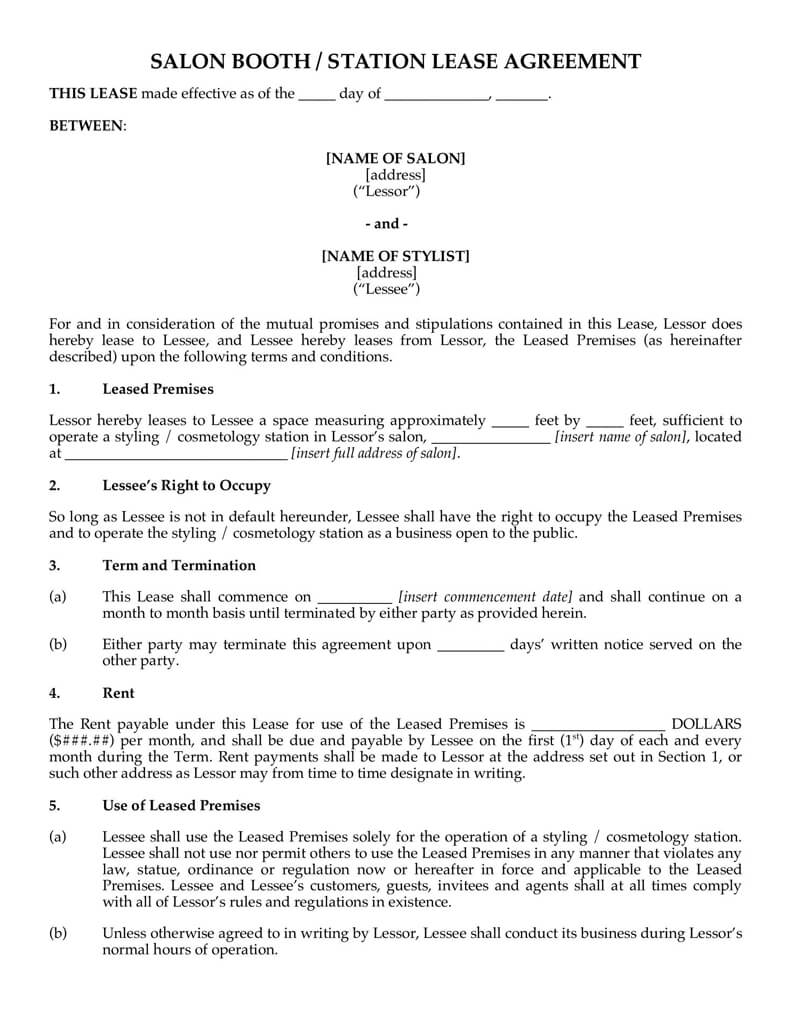
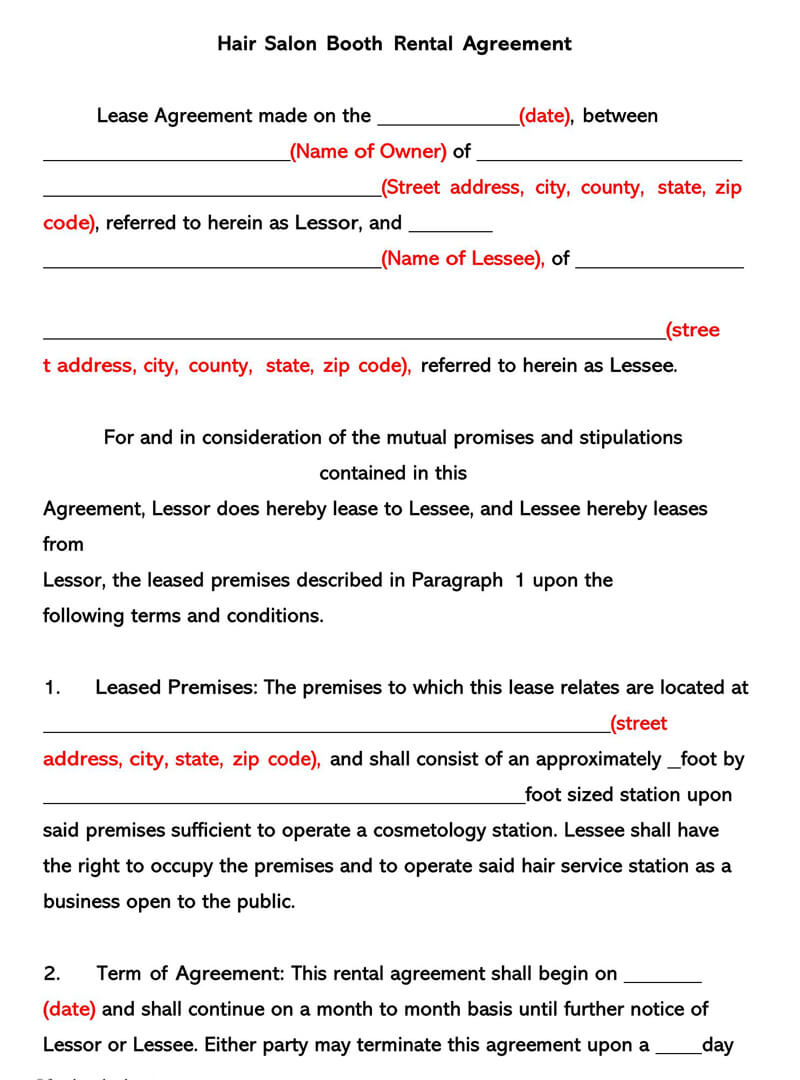
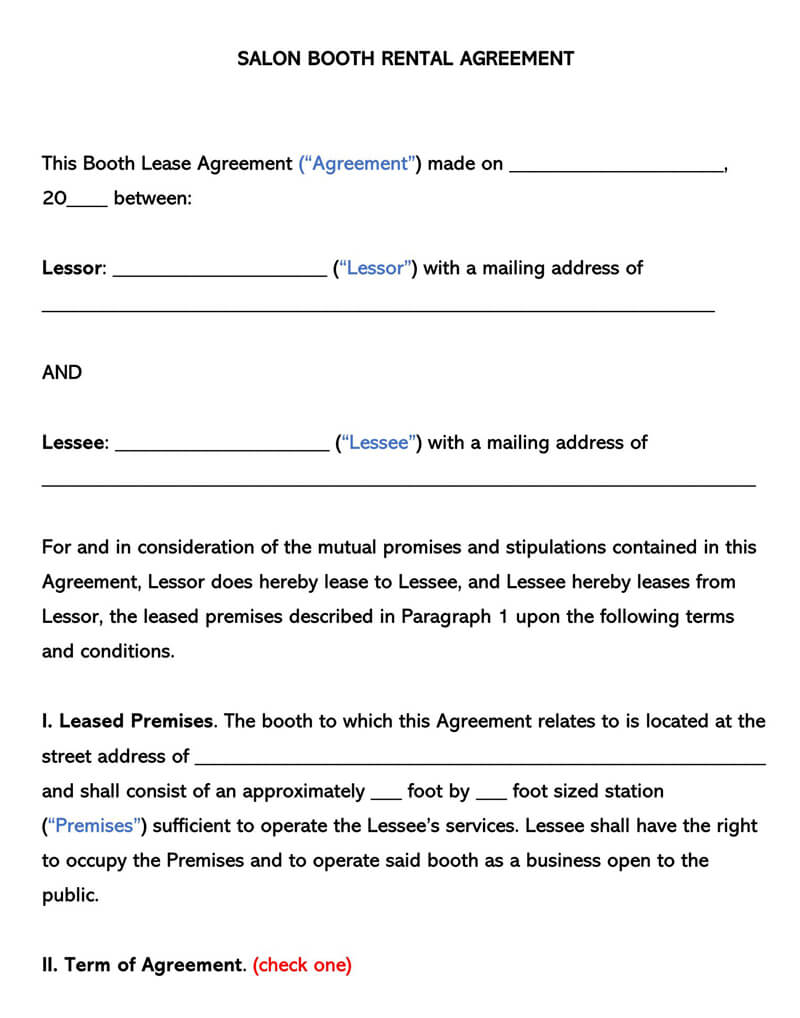
Requirements for the Agreement
For the booth rental agreement to be considered valid, the parties involved must include the following information:
- The date of the agreement: The date on which both parties sign the salon booth rental agreement should be indicated.
- The address and name of the lessor (owner): The owner’s name and a valid address should be included in the document. The owner’s name should be the same as those indicated in the business registration documents to prove that they can legally rent the premises.
- The name of the lessee (renter): The name of the renter should also be included and should be the same as on their identification documents.
- The street and address of the salon: The street and address of the salon should be included in the document to properly identify the property.
- The size of the booth, i.e., the length and width: The size of the booth should be included in the document to prevent disagreements over space.
- The term/duration of the agreement: The terms of the booth rental agreement, i.e., when the agreement will commence and when it should end, should be indicated. It should also include a provision about the possibility of a renewal of the agreement.
- The rent amount: The amount that the lessee will be required to pay when leasing the booth should be included, as should the frequency with which such payments are to be made.
- Use of the booth: The agreement should also define the permitted use of the booth. Any prohibited activities and uses should also be mentioned.
- Equipment and any personal property provided by the owner: In booths, the owner usually provides specific equipment, and there are some that the lessee should bring with them to ensure the smooth operation of their daily activities. Any equipment that the owner will provide should be indicated in the rental agreement.
- Real estate taxes: In most cases, it is usually the lessor’s responsibility to pay any property taxes. However, in some situations, the lessor may require that the lessee pay a specific percentage of these taxes. If this is the case, such provisions should be included in the agreement.
- Applicable state laws: The agreement should have a provision for the applicable state laws that will be used to solve any issues relating to the rental agreement.
- Conditions for default: It is also necessary to indicate the conditions that constitute a default by the lessee and the penalties in such a case. The purpose of including such details is to be transparent about the terms and conditions of the contract and ensure that there is absolute clarity about them.
- Specify the terms: By “terms of the agreement,” we mean the duration of time during which it will be effective. There are three main kinds of booth rental agreements, namely:
- Fixed which lasts longer than a month and is in many cases, non-renewable. Here, the two parties specify the start and end dates of the rental agreement.
- The month-to-month agreement lasts strictly one month or 30 days. It states the dates when the rental period will begin and end. Given that it may be terminated prematurely, a clause exists which specifies when exactly such a termination may be invoked.
- Week-to-week, as the name implies, strictly stays in force for one week. It remains in force on a week-to-week basis until either party decides to end before that. A clause also exists here to specify exactly when termination may have to be invoked.
- Signature: As a final measure, you should append your signature and those of the witnesses. Make several copies, and then serve each party with at least one copy.
When to Use It
From the lessor’s perspective, the agreement is to be used to establish the terms of the agreement, i.e., the rental payment, use of equipment, and the duration of the rental period. It is also important that all rules regarding the use of the rented space should be mentioned in the salon booth rental agreement.
How to Make Salon Booth Available for Rent
There are various reasons why the owner of a salon may choose to rent their space. One of the most common reasons is to have more customers in the business. When renting the salon, the lessee is often required to pay a fixed amount in rent in addition to a specified percentage of their gross sales. Before renting out a booth, the owner must ensure some specific things to make sure that they get the right tenant.
Here are things to do if you want to rent space in your salon:
Find a skilled hairstylist
The first thing to do is to find a skilled hair stylist for a salon. One can do so by using various means, such as creating posters, job advertisements, and online platforms. It is important to consider their previous relevant work experience when shortlisting potential tenants.
Arrange an interview
After shortlisting potential tenants, schedule an interview to understand their client’s list and why they are not currently working. The best candidates are those with a good personality who can bring many clients to their new workplace or salon.
During the interview, make sure to:
- Gather information on work experience and skills: The lessor should ask the potential lessee to provide them with their resume. This will aid the salon owner in knowing their work experience and being sure that the hairstylist will be able to generate enough business and be able to pay salon rent as well.
- Ask questions: Before finalising a candidate for the booth, the property owner needs to ask the potential lessee about the promotion of their business and how they plan to do it. In most salons, if it is the owner’s responsibility to promote the business, they usually require the lessee to pay them a standard percentage of their total revenues, which is usually 50%.
Conduct a background check
It is always standard procedure to conduct a background check on salon renters, and it is important to ask them to sign the authorization form for the check. Once they have given consent, the salon owner may proceed to conduct a background check using available online websites. These websites usually provide basic checks of criminal history, court record searches, and sexual offender searches.
Additional searches are also available, such as verification of professional licences, DMV records, and educational qualifications.
Verify their licences
In addition to having a pleasant personality and a huge clientele, the prospective lessee needs to have a licence to practise as a hairstylist in the salon. Below is a list of all the states and their databases for professionals that can be used to search for and verify professionals.
Search Licensed Hair Stylists (for your salon) – By State
- Montana
- Nebraska
- Nevada
- New Hampshire
- New Jersey
- New Mexico
- New York
- North Carolina
- North Dakota
- Ohio
- Oklahoma
- Oregon
- Pennsylvania
- Rhode Island
- South Carolina
- South Dakota
- Tennessee
- Texas
- Utah
- Vermont
- Virginia
- Washington
- West Virginia
- Wisconsin
- Wyoming
Discuss the terms
The next step after shortlisting prospective hairstylists is to commence negotiations for a rental agreement. The key item that should be given priority when negotiating is the rent amount. If they have enough clients, the owner should consider decreasing their rent in the hope of gaining more profits and bringing more business into the salon.
Once this has been agreed upon, then the rest of the clauses can be discussed much more easily.
Access to the booth
After the agreement has been made and all the initial payments have been made, i.e., security deposit and first month’s rent of the salon, the lessee should be given access to the premises on the start date or as otherwise defined in the agreement.
The newly hired hairstylist is then approved to offer their services outside of the salon and continue doing so until the agreement comes to an end or is terminated following the agreement.
Conclusion
Typically, it is the salon owner’s responsibility to make sure they attract more clients to increase profits and continue to operate. For any salon business to be a success, it is important to have the right hairstylist(s) working at the salon. They should have a pleasant personality, a huge clientele, certifications, and be licensed to work as a hairstylist. As a result, it is critical to adhere to all the recommendations in this manual to support you when renting a booth in your salon to a hairstylist.





